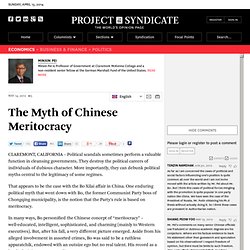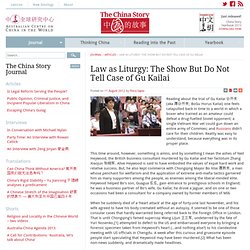

China Contemplative After Tumultuous Olympics - China Real Time Report. Reframing China Policy: The Carnegie Debates. To address this foreign policy imperative, the Carnegie China Program is hosting a series of debates on the most critical—and controversial—issues involving China’s economic, political-social, and military evolution and their policy implications. The main purpose of the debates is to provide fresh thinking based on systematic, well-informed deliberation of the main issues. The series is primarily for members of Congress and their staffs but will also reach a wider audience of experts, opinion leaders, and the general public through limited invitations and broad internet dissemination.
The series so far: Communist Party Rule (October 5, 2006) Can China sustain its combination of authoritarian governance and capitalist economics? Economic Growth (December 1, 2006) Without significantly accelerated reforms, will China's rapid growth unravel before its economy overtakes the U.S.? The Party: The Secret World Of China's Communist Rulers - Video and audio - News and media. "The Myth of Chinese Meritocracy" by Minxin Pei. Exit from comment view mode.

Click to hide this space CLAREMONT, CALIFORNIA – Political scandals sometimes perform a valuable function in cleansing governments. They destroy the political careers of individuals of dubious character. More importantly, they can debunk political myths central to the legitimacy of some regimes. That appears to be the case with the Bo Xilai affair in China. In many ways, Bo personified the Chinese concept of “meritocracy” – well-educated, intelligent, sophisticated, and charming (mainly to Western executives).
Bo’s rise to power owed much to his pedigree (his father was a vice premier), his political patrons, and his manipulation of the rules of the game. Unfortunately, Bo’s case is not the exception in China, but the rule. One of the most obvious signs of systemic cheating is that many Chinese officials use fake or dubiously acquired academic credentials to burnish their resumes. Read more from our “China’s Scandalous Politics” Focal Point. China's Young and Restless Could Test Legal System - China Real Time Report. 25 Years After Taiwan Embraced Democracy, Netizens Wonder When It Will Be the Mainland’s Turn.
TAIPEI, Taiwan — President Chiang Ching-kuo today decreed the end of martial law imposed by his Nationalist Party 38 years ago when it fled to this island after the communists took over mainland China. (LA Times, July 14, 1987) 25 years ago, the Republic of China government on Taiwan formally announced that it was ending martial law. As @谢宏钰 commented on Sina Weibo, China’s Twitter: On that day, “this island embarked on a different path.” {{1}}[[1]]25年前的今天,这个岛屿解严,走上了另外一条道路,直到现在[[1]] A brief history The current government on Taiwan island, the Republic of China, was originally founded in 1912 on the Chinese mainland and was later consolidated by the Chinese Nationalist Party, or the KMT, led by Chiang Kai-shek. Rights to free speech and free assembly vanished; newspapers were censored.
Life after military rule Everything changed, including the details. Before they allowed for opposition political parties, many predicted that once the people could form parties, chaos would erupt in Taiwan. Law as Liturgy: The Show But Do Not Tell Case of Gu Kailai. Reading about the trial of Gu Kailai 谷开来 (aka 薄谷开来; BoGu Horus Kailai) one feels catapulted back in time to a world in which a boxer who trained as an amateur could defeat a drug-fuelled Soviet opponent; a single Vietnam War vet could gun down an entire army of Commies; and Russians didn’t care for their children.

Reality was easy to understand, because everything was in its proper place. This time around, however, something is amiss, and by something I mean the ashes of Neil Heywood, the British business consultant murdered by Gu Kailai and her factotum Zhang Xiaojun 张晓军. Alive Heywood is said to have embodied the values of expat hard work and relative success. But, he also kept commerce with Chongqing Mayor Bo Xilai 薄熙来, a man whose penchant for welfarism and the application of extreme anti-mafia tactics garnered him as many supporters among the people, as enemies among the liberal-minded elite.
Fact and Speculation A Trial as Ritual A Secular Liturgy Notes: Neil Heywood scandal: Wang Lijun 'has been secretly put on trial' Sheldon Adelson’s Dealings in China Are Under Investigation.